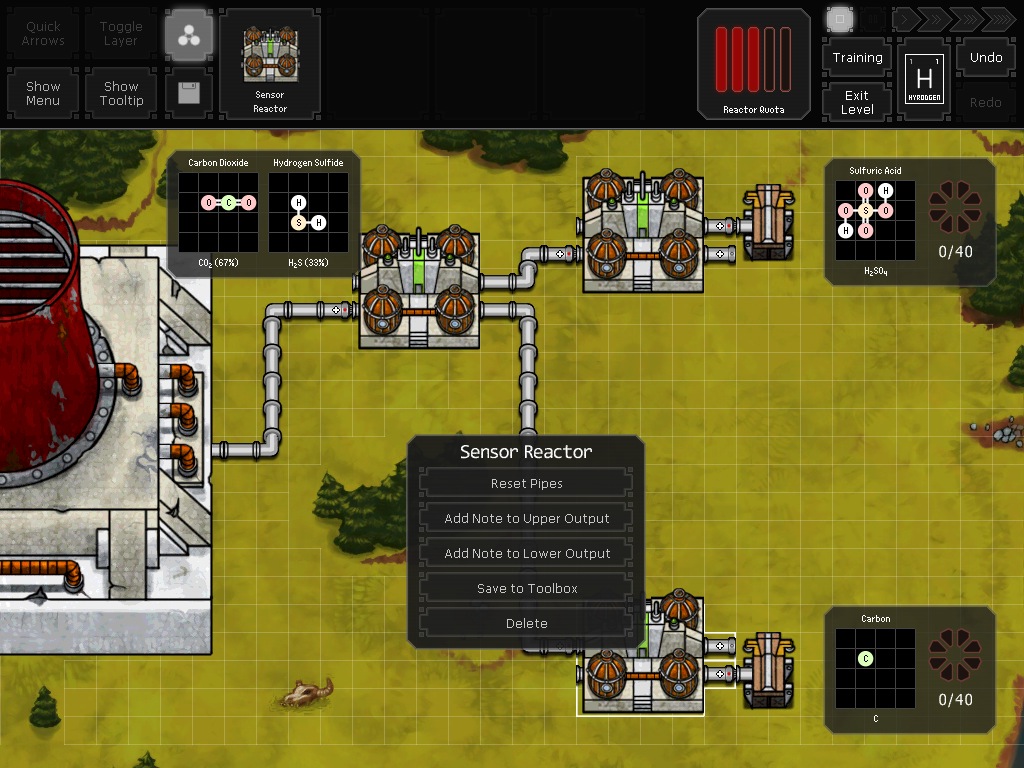

No matter how clever it is, Sokobond can’t escape the limits of its own self-imposed simplicity. However (and there was always going to be a “however”) I wouldn’t call it deep. It means one of those alarm bells that rung when I bought it turned out to be a false one Sokobond is both simple and clever, with a design that truly is elegant. You’ll end up making extensive use of these rewind functions, especially during later levels where it introduces additional mechanics like squares that break molecular bonds or rotate molecules when you move over them, or the inert helium atoms that nearly always have to be used as buffers to push other atoms around without bonding with them despite its apparent simplicity Sokobond uses these three or four extra mechanics along with some extremely well thought-out level design to keep things interesting.
#Spacechem split before bonding free#
Often you’re called upon to manipulate atoms that you don’t want to bond with yet, and must push them around using inert atoms that have already used up all of their free electrons in pre-existing bonds.īecause of all this it’s easy to get to a position where a level becomes unwinnable, but Sokobond realises that this is potentially the most annoying thing a puzzle game can do and does everything it can to keep your blood pressure low, either allowing you to step back through your moves one at a time until you a reach a point before you fucked everything up, or else reset the entire level to the beginning. Hydrogen atoms only have a single electron in the outer shell and which can therefore only make a single bond each if you nudge together two hydrogen atoms that aren’t connected to your main molecule and they bond, you’re screwed because there’s usually no way to separate them. For example, if you accidentally bond your molecule together into something three atoms wide and you have to get it through a gap that’s only two atoms wide, you’re screwed.

The first is that you don’t have any control over whether two atoms bond or not if they’re in adjacent squares and they each have a free electron they will bond together, and this is a hell of a restriction when combined with the clever level layouts. Sokobond’s challenge arises from two key elements.

Your job is to use your control atom to connect up all the atoms on the level in such a way that none of them have free electrons left, thus constructing a stable molecule. Move the atom next to another atom that also has a free electron and the two will bond together, and the next time you move your control atom it’ll drag the bonded atom along with it. This atom will have one or more little circles orbiting around its outer edge, each or which represents a free electron in the atom’s outer shell. You start each level with control of a single atom, which can be moved around using the arrow keys. It is to Sokobond’s great credit (and to my great surprise) that it mostly succeeds.įirst, though, what is Sokobond? It’s a faux-science-y puzzler based around bonding together individual atoms to create molecules. It does mean, however, that Sokobond lives - or dies - on the strength of its level design, which needs to provide enough variety and complexity to compensate for those relatively simplistic mechanics. There has been an intentional decision to drastically limit the number of ways you can manipulate the various atoms as you try to construct a given molecule, making Sokobond a very simple game at heart. Sokobond is a much lighter puzzle game whose challenge arises from the restrictions it places on the player, and whose levels are often over in a matter of seconds if you spot the trick behind them early. SpaceChem was a comprehensive game that gave you the tools to build a freeform system that would produce the desired molecule and left you to get on with it, with each level sometimes taking multiple hours to figure out. Now, as it turned out that SpaceChem comparison isn’t that valid. This didn’t exactly augur well for Sokobond, but on the other hand its molecule-arranging gameplay did remind me of SpaceChem and SpaceChem was awesome, so I decided to give it a whirl. Co-opting of a science-y theme to make itself seem cleverer than it really is? Check. Use of the words “minimalist” and “elegant” – which too often turn out to be synonyms for “shallow” and “vapid” - to describe the game on its Steam store page? Check.

Indie darling, with suspiciously high review scores from the usual suspects? Check. Sokobond is a puzzle game that tripped several of my alarm bells when I bought it.


 0 kommentar(er)
0 kommentar(er)
